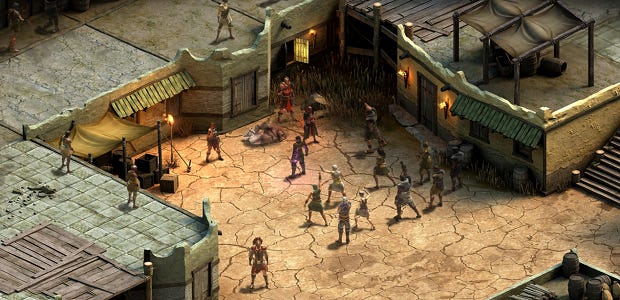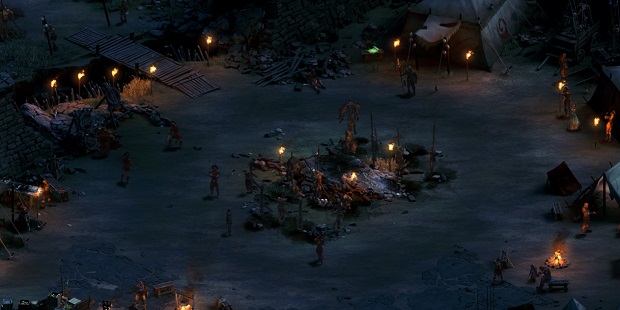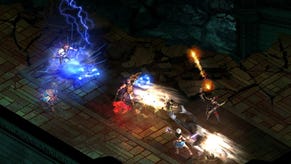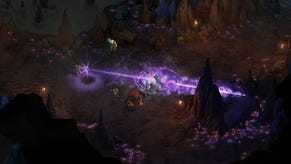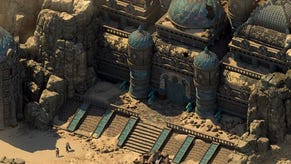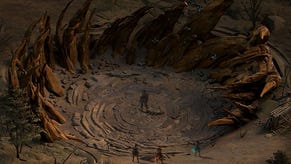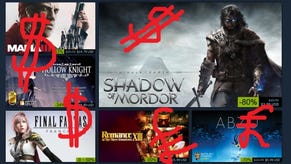Magic And Myth In A Post-War World: Tyranny
It's a bad, bad, bad, bad world
I've seen Tyranny [official site] several times before and I even played it out at E3, but it was only after a hands-on session at Gamescom that I felt ready to write about Obsidian's next RPG. It's a tricky one to preview, seeing as so much of the pitch relates to a world that changes to reflect the Big Choices you make. In a game that's so keen to gesture toward the bigger picture, it can be difficult to get a sense of how well the smaller moments work toward that end.
At Gamescom, I played a new section of the game, crafted some spells, and decided that even if I can't know how well the bigger picture will come together, there's enough here to understand at least some of what Obsidian are building. It's strong stuff.
At one point, I thought I'd landed on the perfect summary sentence: “Tyranny is the Icewind Dale to Pillars of Eternity's Baldur's Gate”. Problem with that perfect summary is that it's probably based on a false premise. What I've played of Tyranny focuses on combat and more traditional RPG dungeons and quests, with plenty of traps to disarm and roving gangs of enemies to stumble across, but that's most likely because those are the parts of the game easiest to demonstrate in half an hour or less.
Start digging into the turning points in the narrative during those short sessions and you're likely to run into problems. If I can pick a side in a localised conflict, which will then have an impact on the wider world, I'm not going to see that impact half an hour later. Give me some spells, skills, legendary weapons and a tricky dungeon layout to play with, and I can see exactly how the whole thing works.
The combat system in Tyranny is excellent. I've always preferred a full-on turn-based combat system to Infinity Engine style pauses for thought, but the four-person parties here are manageable and specialised. Every character has something to offer and it's easy to see the impact of skills that aggro enemies, directing their attention toward a tough-as-nails bastard who can take the damage, as well as those that chip away at armour or create vulnerabilities.
Armour is very important. Unleashing your strongest attacks won't achieve a great deal if an opponent is protected, so the order in which you direct your attacks can be as important as their targets. In the portion I played at Gamescom, ethereal horrors were spawning and spilling out of the walls. Some were vulnerable to ice, some were vulnerable to fire or electricity. The tougher, boss variants were slightly vulnerable to just about everything but didn't have any one specific weakness to exploit.
If you're anything like me, those kind of encounters lead to lots of pausing and hovering over spells and skills to find just the right one for the occasion. Then you hover over the enemies to make sure you're definitely delivering the fireball to the creature that, like every Brit right now, complains as soon as the world around them ceases to qualify as 'dank'. There are combos to consider, both in the form of skills that actually require two characters to commit to them and sequences of attacks that work well together one after the other. For me, that kind of tactical play mostly involved using a rogue to knock somebody over and then having everyone else pile on top. And I'm playing the good guys.
At least I think I am. Tyranny's pitch is easy to misunderstand; it's not necessarily a game about playing the villain, rather it's a game where the bad guys won. A sequel to a game you've never played, in which the heroic band of adventurers failed and evil triumphed. In your position of privilege in the new world order, you have an enormous amount of responsibility – you're carrying out big tasks for The Man and The Man is a Bad Man – but you're not being used as a tool to terrorise the factions and individuals you meet along the way. You're part of the post-conflict plan, switching between warrior, peacekeeper and diplomat as the situation dictates. The great promise of Tyranny's story is that it'll tell the high fantasy version of post-occupation blues, and in what I've seen there are some tricky decisions to be made about asserting control of populations and cultures in a power vacuum or the aftermath of brutality.
Quite how that sits alongside the much more traditional dungeon crawling of this most recent demo, I'm not entirely sure. Down in the ruins of the world, in this case part of an enormous wall that has fallen into neglect and nightmare, it appears to be RPG business as usual.
That's no bad thing, and the addition of a spellcrafting system and flavoursome legendary weapons is very attractive indeed. The spellcrafting works around collecting sigils (either from characters or in the world) and combining them to create new abilities, utilising a base element, form of expression (cone, AOE strike, bolt, beam, touch) and additional, optional modifiers. Based on what I've seen, which is very little, the spells you can create aren't as weird or exciting as those on Divinity Original Sin 2's vast cocktail menu, but even if they're all iterations or variations on the usual D&D arsenal, the ability to modify and name them makes them feel more personal to the characters they're attached to.
The same is true of legendary weapons. They have spiffy names and provide a brand spanking new skill to whoever wields them, but they're not game-changers so much as embellishments on the world and your characters. As the lore goes, they're named, unique items within the world, and there's a lovely touch in that the more you use them, the more famous they become. Although they've already made a mark on history, you're adding to the list of their legendary deeds, and that makes them more powerful still.
I might not be clear on how attractive the bigger picture will be but a lot of Tyranny's smaller details are adding up into something substantial and evocative. At this point, I want to see more of the world and I want to see how I can change it, but – importantly – I also want to spend time playing with the combat system and exploring dungeons. Having a levelling system based entirely around skillsets rather than classes means I can change that wizardy fellow into a flame-spewing tank if that seems like a good idea, and I can have a speedy rogue-like who packs a real punch.
The grand schemes of this oppressed world might be unclear until we actually get to sit down and play the whole thing from start to finish once or twice, but I'm becoming comfortably excited about that prospect.
Tyranny will be out later this year.
